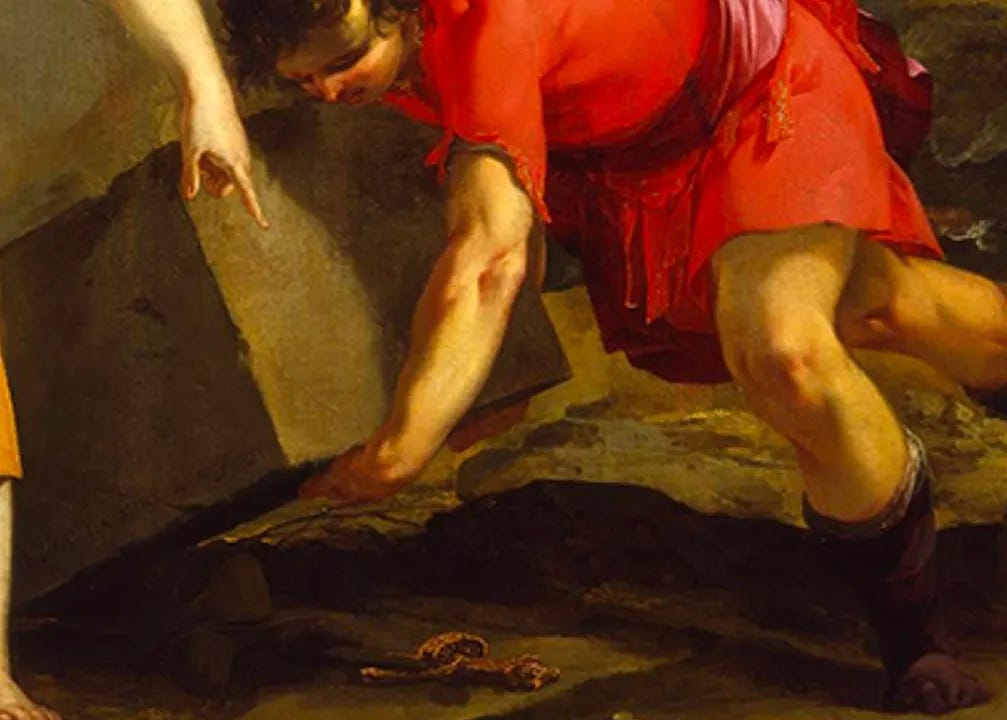The Sword of Theseus
by Dominique Venner
Dominique Venner sees the Greek myth of Theseus’ discovery of his father’s hidden sword as reflecting how Europeans possess a forgotten cultural and spiritual heritage that lies dormant, waiting to be reclaimed. Venner suggests that this heritage—symbolized across European cultures through similar sword myths (Excalibur, Sigurd’s blade)—can only be recovered through conscious effort, personal worthiness, and historical knowledge.
Among all the exploits attributed to Theseus, legendary hero of the Athenians, the most famous is the slaying of the Minotaur, the Cretan monster to whom the ancient populations of Attica had to pay bloody tribute. The mythical account of the discovery of his heritage, transmitted by Pindar and Plutarch, cannot leave us indifferent. Theseus was the son of Aegeus, king of Athens. Having been unable to have a son by his legitimate wife, Aegeus heeded the counsel of the gods and impregnated Aethra, daughter of the king of Troezen. Thus was Theseus born.
Raised in his mother’s family, the child knew nothing of his father. The latter had ordered that nothing be revealed to him of his origins until he was capable of lifting a rock under which Aegeus had hidden his sword before departing. And so it was done.
When Theseus was 16, his mother led him to the rock. The young man lifted the stone effortlessly and seized the sword. The secret of his birth was then revealed to him. Forthwith, he decided to rejoin his father, accomplishing during the journey a series of exploits proving that he was truly the son of a king.
Athens was still governed by Aegeus. However, he had fallen under the power of the sorceress Medea. The latter understood who Theseus was and resolved to poison him. Yet, during a banquet organized for this purpose, Theseus drew his sword to carve a quarter of meat. Immediately his father recognized him and saved him. Then, assured of the continuity of his power, he reclaimed his rights and drove out Medea.
Like Theseus, the French and Europeans are the custodians of an equally royal heritage, that of their origins and their history, but they do not know it. This heritage has been concealed from them. They will find it again only on the condition of proving themselves worthy of it through trials. Such is the meaning of the myth of the sword hidden underneath the stone.
In similar forms, this myth of recovered memory is present at the heart of the founding legends of other great European cultures: in Celtic lands with Arthur’s sword, in Nordic lands with that of Sigurd. Both of these swords come to them from their fathers without their knowing it. Excalibur was planted in a stone by King Uther before dying. Sigurd’s sword comes to him secretly from his father Sigmund, via the blacksmith Regin who reassembled its broken pieces.
Such similarity cannot be fortuitous. Along with so many other signs, it manifests the kinship uniting European peoples through their founding myths. The myth of the hidden heritage also tells us that, without knowing it, we follow in the footsteps of our often-forgotten fathers.
Metaphor for royalty, uprightness, and valor, the sword designates a spiritual heritage. This consciousness comes only through effort of knowledge, the paramount function of history, with the teaching of reality and the recall of collective memory.
Originally published in La Nouvelle Revue d’Histoire no. 1 July-August 2002.
Translated by Alexander Raynor





Might be encouraging for a Frenchman living in Paris or the banlieu, but good luck with that. There is no sword.